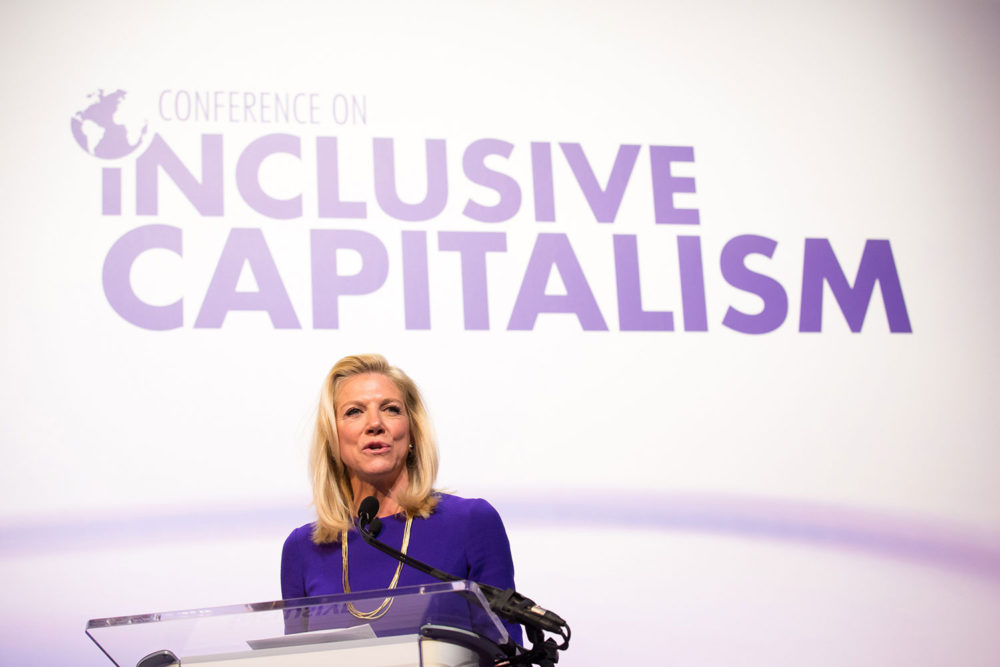True, “God did not create the corporation,” according to Lady Lynn Forester de Rothschild, chairman of the Coalition for Inclusive Capitalism, in Gavin Hinks’ excellent interview for Board Agenda.
But, in the greatest management story ever told—“The Puritan Gift – Reclaiming the American Dream Amidst Global Financial Chaos”—Ken and Will Hopper (engineer and investment banker) founded their thesis for a renewed and more enlightened capitalism. This is founded in the original purpose of the Puritan migrants to America in 1630, who wanted to create a “kingdom of heaven on earth”. What better goal could anyone wish for?
This is all very well, but what board has the time or inclination to revisit and ponder the essential nature of their business today, especially when they have so many other, ever-changing priorities competing for their attention?
Most boards are probably a tad “punch drunk” after being pummelled by a series of blows from changing regulations, environmental issues and diversity. They also have to work out the best way to report coherently on all of this while still running the business well enough, using conventional P&Ls and balance sheets, to keep shareholders happy.
Clear societal purpose
But Lady Lynn is absolutely right. There has never been a more appropriate time to ask boards to put their best thinking caps back on and rethink the purpose of the corporation. It is also the right time for a new, professional, “single umbrella body pulling all the current thinking together”—the Maturity Institute—to oversee the necessary change in leadership and management education that will produce a generation of mature leaders with a clear societal purpose.
One frustration that comes with adopting a societal perspective is that “society” is an amorphous and fickle beast. When it wanted to be fed oil it did not consider the side effects. Now it wants green energy but only at the right price. There is no pleasing some people and piecemeal tinkering with the rules of the game is not the answer.
The Maturity Institute (MI) provides the whole-system, multidisciplinary approach that is necessary to turn the chaos of a failed system into the virtuous circle of inclusive capitalism. Our overarching, systemic question is: “How does society ensure it is getting the best possible value out of, and for, itself?”
Lady Lynn needs the simplest, most convincing, easiest-to-implement answer if she is to realise her vision. The board must begin by articulating its own vision in a way that is likely to be perceived as serving society long into the future.
Societal and shareholder value

As Lady Lynn’s logic dictates, this is dependent on having the right tools and measures to check progress but, just before we explain the MI solution in more detail, it has to be emphasised that this does not have to be an either/or option. Societal value and shareholder value must be mutually reinforcing if inclusive capitalism is to become a reality.
In a world of truly inclusive capitalism everyone gains; nothing is lost.
Underpinning these deep, philosophical questions is a very simple truth, which is already incorporated into MI’s purpose of maximising societal value. The number-one responsibility of an inclusively capitalist board, the very thing that imbues legitimacy, is to demonstrate that it is doing everything in its power to ensure it is getting the maximum value contribution from every single person working in it and with it.
Inclusive capitalism should be synonymous with the very highest standards of professional, human capital management. Those standards can only be reached when the corporation works as a highly effective whole system internally and plays its part externally by supporting a sustainable world system, where environmental concerns are fully factored into its operations, with no trade-offs between profit and societal impact.
Lady Lynn is quoted as saying: “Directors need to ask a lot of questions about the long-term strategy and how the intangible aspects of a company are being managed to create long-term value at the employee level, at the environmental level, at the social level and certainly at the ethical level.”
Thirty obvious questions
This might sound like a huge task, yet for the MI it amounts to a series of just 30 obvious questions that could be an agenda item for the next board meeting. This OM30 instrument was designed to focus, as does the Inclusive Capitalism Coalition, on investors.
The MI adopted the lingua franca of an “AAA” credit rating scale to ease understanding of the complex set of interconnected issues at play. It has already been used to rate many large, global corporations and, in doing so, enables society to see a measure of their Total Stakeholder Value (TSV). It is freely available and simple enough for any intelligent Board member to work out their own, initial score.
The companies that Lady Lynn cites as being “among the organisations that … are already practising inclusive capitalism” have already been rated by OMINDEX—Schroders (BBB-), Legal & General (BBB) and Aviva (BBB). These ratings already provide some supporting evidence for her contention, but there is still plenty of room for improvement in value, both financial market and societal.
Change does not have to be painful but it is an unfortunate and paradoxical fact of life that people, generally, do not welcome change. So should change be enforced or is voluntarism a better principle to work from?
The ground-breakers and change agents like Lady Lynn will attract early adopters—that is a natural part of the process of mankind’s evolution. And maybe government authorities and regulators should take a step back before rushing headlong into more rules and reporting requirements, if they do not form part of an integrated, whole-system solution.
Much better to help boards see the real financial value of their people, in tangible terms that connect directly to the P&L and balance sheets, while offering society a much more durable form of capitalism for the very long term.





